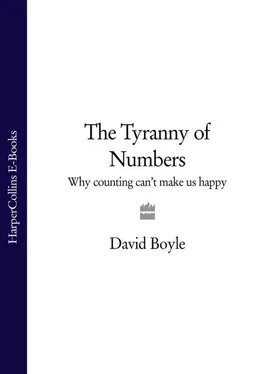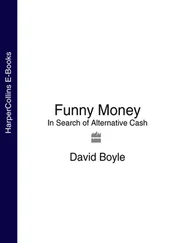But how far do you go? Do you, as they did for some flood control schemes, work out how many seagulls would live in the new reservoir, and how many grasshoppers they would eat, and what the grain was worth which the grasshoppers would have eaten? Do you work out what these values might be in future years? Do you value property when no two estate agents can name the same price? ‘I would not say it was a guess,’ one of their officials told the US Senate about property values. ‘It is an estimate.’ And after all that, it is economists who persuaded the US Secretary of the Interior, Bruce Babbitt, to start demolishing the dams their predecessors laboriously calculated.
So here’s the paradox. Numbers are democratic. We use them to peer into the mysterious worlds of professionals, to take back some kind of control. They are the tools of opposition to arrogant rulers. Yet in another sense they are not democratic at all. Politicians like to pretend that numbers take the decisions out of their hands. ‘Listen to the scientists,’ they say about BSE or genetically-modified food. ‘It’s not us taking the decisions, it’s the facts.’ We are submitting these delicate problems to the men in white coats who will apply general rules about individual peculiarities. It is, in other words, a shift from one kind of professional to another, in the name of democracy – from teachers and doctors to accountants, auditors and number-crunchers. And they have their own secretive rituals that exclude outsiders like a computer instruction manual.
But when it comes to auditing the rest of us in our ordinary jobs, auditing undermines as much trust as it creates – because people have to defend themselves against the auditors. Their lives – usually their working lives – are at stake, and their managers will wonder later why the figures they spent so much to collect are so bizarrely inaccurate. And as we all trust the companies and institutions less, we trust the auditors less too.
Counting paradox 4: When numbers fail, we get more numbers
Because counting and measuring are seen as the antidote to distrust, then any auditing failure must need more auditing. That’s what society demanded the moment the Bank of Credit and Commerce International had collapsed and Robert Maxwell had fallen off his yacht into the Bay of Biscay. Nobody ever blames the system – they just blame the auditors. Had they been too friendly with the fraudsters? Had they taken their eyes off the ball? Send in the auditors to audit the auditors.
If the targets fail, you get more targets. Take the example of a large manufacturer that centralizes its customer care to one Europe-wide call centre. After a while, they find that the customers are not getting the kind of care they were used to before. What does the company do, given that it can’t measure what it really needs to – the humanity and helpfulness of their service to customers? They set more targets – speed answering the telephone, number of calls per operator per day. They measure their achievements against these targets and wonder why customers don’t get any happier. ‘People do what you count, not necessarily what counts,’ said the business psychologist John Seddon.
Конец ознакомительного фрагмента.
Текст предоставлен ООО «ЛитРес».
Прочитайте эту книгу целиком, купив полную легальную версию на ЛитРес.
Безопасно оплатить книгу можно банковской картой Visa, MasterCard, Maestro, со счета мобильного телефона, с платежного терминала, в салоне МТС или Связной, через PayPal, WebMoney, Яндекс.Деньги, QIWI Кошелек, бонусными картами или другим удобным Вам способом.












